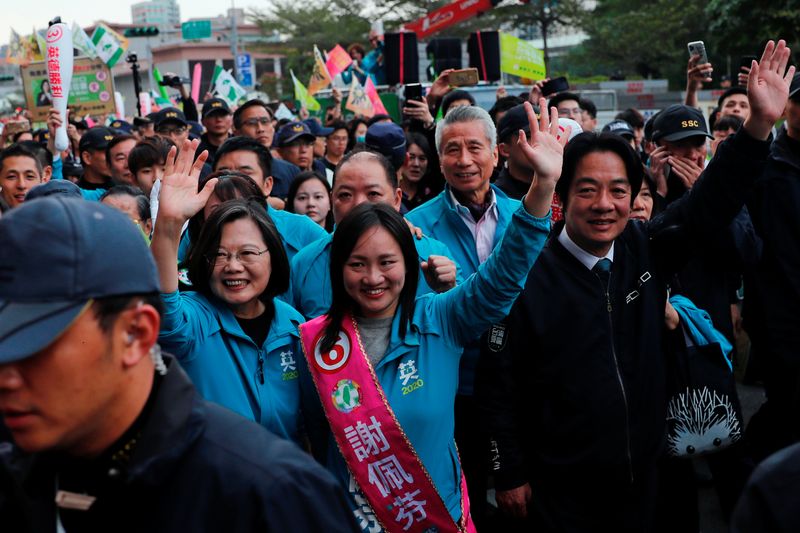By Yimou Lee and James Pomfret
TAIPEI/KAOHSIUNG, Taiwan (Reuters) - Taiwan President Tsai Ing-wen urged young voters on Friday to turn out and show protest-wracked Hong Kong the meaning of democracy on the eve of elections held in the shadow of anti-government protests in the Chinese-run city across the sea.
Taiwan holds presidential and parliamentary polls on Saturday against the backdrop of both Hong Kong's unrest and Chna's new push to get the democratic island to accept its rule.
The China issue is front and center in the campaign, especially after President Xi Jinping warned last year Beijing could attack Taiwan, though adding he would prefer a peaceful "one country, two systems" formula.
The former British colony of Hong Kong returned to Chinese rule in 1997 under such a formula aimed at ensuring a high degree of autonomy.
But that model has never been popular in Taiwan and is even less so now after the protests in Hong Kong, largely triggered by fears that Beijing is slowly eroding freedoms. Beijing denies that.
Speaking at her final, packed rally in Taipei, Tsai urged people to look across the Taiwan Strait to Hong Kong.
"The young people of Hong Kong are using their lives and blood and tears to show us that 'one country, two systems' is not feasible," she said.
"Tomorrow it's the turn of our young people in Taiwan to show them that the values of democracy and freedom will overcome all difficulties."
China claims Taiwan as its sacred territory, to be taken by force if needed. Taiwan says it is an independent country, called the Republic of China, its official name.
Tsai and her Democratic Progressive (NYSE:PGR) Party (DPP) are being challenged by Han Kuo-yu of the main opposition Kuomintang party. He favours close ties with Beijing and says this is the only way to ensure Taiwan's security and prosperity.
OPPOSITION SAYS TAIWAN ISOLATED
Speaking at his own mass rally in the southern port of Kaohsiung, where he is mayor, Han criticised Tsai for doing little in the past four years apart from increasing Taiwan's international isolation and described ties with China as "freezing".
"They can't produce any achievements," Han told supporters, with banners by his side carrying a campaign slogan, "Taiwan safe, people get rich".
He did not mention Hong Kong.
The United States, Taiwan's top arms supplier and most important supporter even in the absence of formal diplomatic ties, will also be watching closely, having warned in the run-up to the vote against Chinese attempts to sway the election.
The de facto U.S. ambassador in Taiwan, Brent Christensen, is scheduled to meet Tsai on Sunday morning, according to Taiwan's presidential office.
The Hong Kong protesters have widespread public sympathy in Taiwan, and both the DPP and Kuomintang have pledged to help any Hong Kong people who flee to the island.
Both Tsai and Han have rejected "one country, two systems". The DPP has painted a vote for the Kuomintang as effectively a vote for the model, something Han has angrily denied.
Taiwan's noisy, colourful elections are a marked contrast to China, where the Communist Party brooks no challenge to its rule and where ordinary people have no say in who governs them, something that can be a shock to Chinese visitors.
"I didn't expect to see singers on stage. For a while I felt like I was in a concert," said Yin Weiguo, a 27-year-old Chinese engineer on a business trip to Taiwan, who attended a Han rally in Taipei on Thursday.
"I just wanted to see what people did at a rally. There were so many people," Yin told Reuters while visiting Taipei's Chiang Kai-shek Memorial Hall, a major tourist site.
Voting begins at 8 a.m (0000 GMT) on Saturday and polls close at 4 p.m. (0800 GMT).

The new president will be inaugurated in May.